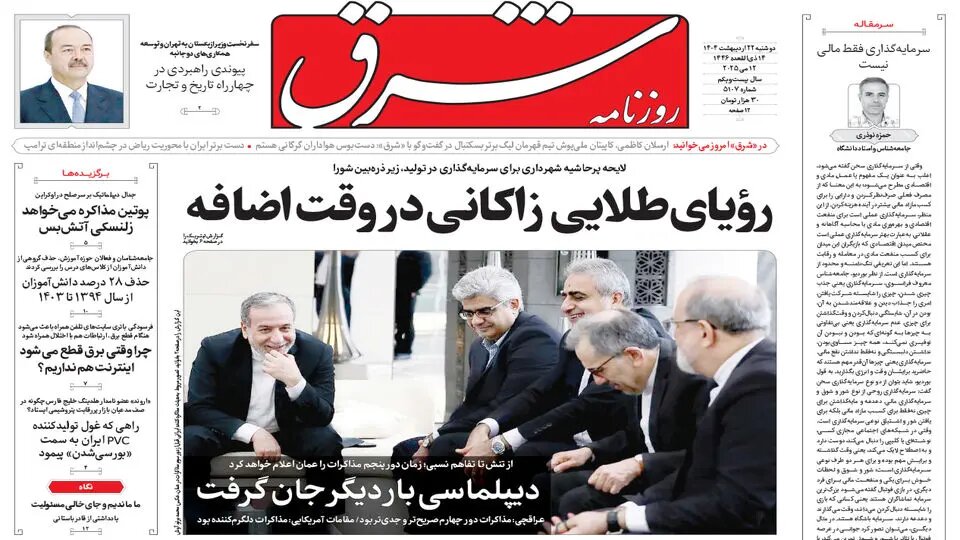Effective lifting of sanctions is Tehran's main demand

TEHRAN - In an analysis, Shargh addressed the fourth round of negotiations between the Iranian and U.S. negotiators and said: The fourth round of the talks were held as Iran's main demand, which has been heard many times by the Foreign Minister and the Ministry spokesperson, is the effective lifting of sanctions and the stop of any action that would restrict and sanction the Iranian economy and affect Iran's economic dividends.
According to many experts, America's strong addiction to sanctions and the Zionist regime's strong influence on its decision-making structures have raised very serious questions about America's will and ability to adhere to any possible commitment to removing sanctions. These negotiations have begun while the Middle East is witnessing sensitive diplomatic moves. The timing of these talks with U.S. President Donald Trump's upcoming visit to Saudi Arabia, Qatar, and the UAE has added to the importance and sensitivity of this round of talks. Experts believe that the results of these talks could have a significant impact on the future of Iran-U.S. relations as well as regional stability.
Jam-e Jam: A game of getting points or end of diplomacy?
In a note, Jam-e-Jam addressed Steve Witkoff's controversial remarks regarding Iran’s nuclear enrichment: Witkoff called for "zero enrichment, dismantling of the Natanz, Isfahan and Fordow facilities, and the destruction of centrifuges." Witkoff's harsh statements can be analyzed from several points of view. On the one side, Benjamin Netanyahu calls for zero enrichment and the complete dismantling of Iran's nuclear program in the style of the Libyan model. On the other side, the Trump administration is trying to weaken Iran's position in the negotiations with new sanctions against Iran's oil network and military threats. These harsh statements can be interpreted as part of the U.S. negotiation strategy to get points or prepare public opinion for the possible failure of the negotiations. Iran has always shown its good intentions by maintaining cooperation with the Agency (IAEA) and considering proposals such as exporting some of its enriched uranium to Russia or stricter monitoring by the Agency, but Witkoff's statements, especially on the eve of the (fourth round of) negotiations, could be a sign of an attempt to find an excuse for military action or new sanctions.
Sazandegi: Travel to the region on eve of the fourth round of talks
Sazandegi commented on Araghchi's visit to Saudi Arabia and Qatar prior to the fourth round of nuclear talks between Iran and the United States in Oman. It wrote: Iran's continuous diplomatic relations with Saudi Arabia clearly show that relations between Tehran and Riyadh are being strengthened and redefined, especially with the coming to power of the Pezeshkian government, and one of the reasons for this is the need for regional convergence and continuous consultations with neighbors. Israel's moves in creating crises in the region and geopolitical changes in the Middle East have gained more speed because regional and trans-regional actors are also adopting policies in the region based on their own interests, which can sometimes lead to a conflict of interests. An important point that should be considered in this regard is that Araghchi's visits to Saudi Arabia and Qatar took place at a time when two important developments were the focus of attention. The first one is the fourth round of indirect negotiations between Iran and the United States in Muscat. The second one is U.S. President Donald Trump’s visit to Saudi Arabia, Qatar, and the United Arab Emirates, which will begin on Tuesday. The coincidence of these developments can undoubtedly have an important outcome that we should wait for.
Etemad: Suspension neither in Iran’s nor America’s interest
In an interview with Saeed Shariati, a reformist political activist, Etemad examined the fourth round of negotiations and some new demands raised by U.S. officials regarding Iran’s nuclear enrichment. He said: It is highly important to realize that Iran’s national interests lie in reaching a stable situation. Continuing to suspend the talks is problematic and increases expectations in various areas. On one hand, negotiations can lead to the right decision and a prudent choice by both countries. On the other hand, it can lead to a critical and tense situation for both countries. Negotiations will either succeed or fail, but Iran’s economy and market should not be overshadowed by negotiations. This atmosphere of suspense should give way to a dynamic atmosphere that ultimately works in the favor of the negotiators. Ultimately, we should all be optimistic about future developments and hope that our national interests will be realized through the talks.
Leave a Comment